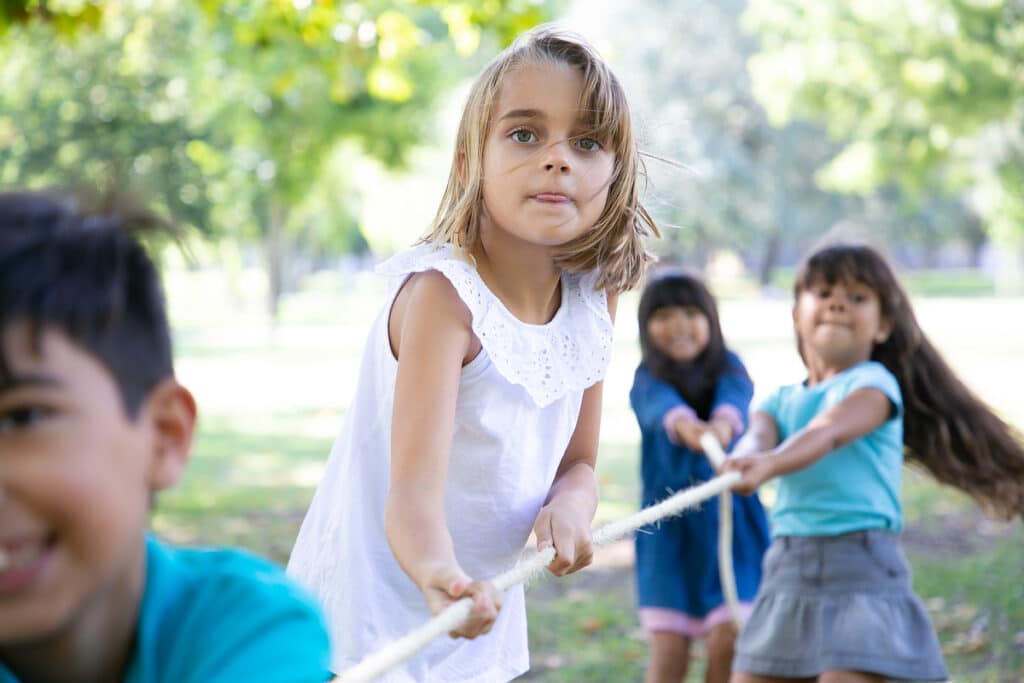
Parenting can become a fulfilling experience when approached with patience, understanding, and a willingness to learn and adapt. This journey will surely bring some bad choices and struggles. We may believe that we are making the biggest parenting mistakes in the world and that others are surely doing a better job raising their children. While each parent has a personal definition of success and failure in their parenting practices, the most common parenting issues mentioned below are studied and recognized by science.
1. Overprotectiveness
Although it is natural for parents to want to protect their beloved children, not giving them opportunities to learn through exposure and exploration certainly is one of the most common parenting mistakes. Overprotectiveness is counterproductive to their development.
Suppose a parent constantly warns their child to “be careful” during playtime and discourages them from trying new things or taking risks. While the parent’s intentions might be to keep their child safe, this behavior can hinder their ability to adapt their movements and skills to gain autonomy.
Overprotectiveness is not limited to early childhood. It manifests in the case of older children too.
For example, some parents are extremely cautious with their children’s social interactions and discourage them from meeting new people. However, socialization can expose children to new experiences and ideas, which can help develop a well-rounded worldview. These experiences also develop social confidence, empathy, and communication skills, minimizing the search for external validation.
Parents can benefit their children by addressing their own insecurities and anxieties. Evaluating situations patiently with the involvement of both the children and a third party can help parents develop a more flexible approach to new experiences, expanding their child’s universe and enhancing their skills.
2. Micromanaging

Some parents want their children to succeed in all aspects of their lives. They start planning their children’s future from a young age. Schools, extracurricular activities, friend choices, planning valuable social interactions, and avoiding the “waste of time.”
However, when parents hover over and micromanage their children’s lives, they may take away their agency in decision-making. This may be one of the worst parental mistakes.
Children may struggle to recognize their preferences and values as they grow older. This can lead to anxiety and uncertainty when facing big decisions, such as choosing a career or a life partner.
Adults wondering how to fix parenting mistakes can start by guiding and offering their children support. Allow them the space to make their own choices and mistakes.
Encouraging children to explore their interests and passions without fear of judgment or criticism can help them develop a sense of individuality and self-awareness. When children feel empowered to make decisions, they can develop the skills and confidence to navigate life’s complexity without waiting for exterior validation.
👉 Are you feeling guilty about parenting mistakes? Go to our article on how to communicate with children effectively and start building stronger relationships with your loved ones. You just have to follow straightforward guidelines that will help you build a positive communication environment.
3. Lack of Boundaries
While some parents may take a micromanaging approach to parenting, others may swing to the opposite extreme of being permissive and uninvolved in their children’s lives. Giving children unlimited freedom of choice without guidance or limits can harm their physical, emotional, and moral development.
Children can become confused or overwhelmed by the lack of structure and routine. The absence of a moral compass can lead them to make poor decisions that could harm themselves or others.
For example, when there are no rules regarding screen time, children may spend hours on devices and miss out on other essential activities, such as playing, exercising, or socializing. Similarly, without guidance on food choices or personal hygiene routines, children may develop unhealthy habits that can have long-lasting effects on their health and well-being.
Giving children freedom and autonomy is unquestionably important and does not always lead to parenting mistakes. On the other hand, allowing excessive permissiveness can have negative consequences. Children need structure, guidance, and consistency to develop healthy habits that stay with them forever.
4. Inconsistent Discipline
Discipline is a critical component of a child’s growth and development. It is a complex concept closely linked to motivation. It’s about becoming a better person through consistent guidance and self-improvement. Consistency plays a vital role in discipline, teaching children to take responsibility for their actions and understand the importance of accountability.
Yet, many parents don’t know how to motivate children without punishment or rewards. Some might follow an impulsive, emotional pattern. One day they punish misbehavior and another, they let it slide, claiming that “kids will be kids.” This is one of the most widely spread parental mistakes.
Inconsistent discipline can create confusion for a child, as they may not understand the rules or consequences of their behavior. It also creates resentment and disengagement in children because they usually don’t know what to expect and what they should do.
5. Unrealistic Expectations
The road to hell is paved with good intentions. This statement is just as good for describing some parenting practices.
Parents often have high expectations for their children. They may want their kids to excel in every area, be the best at everything they do, and follow in their footsteps. However, asking children to be what they are not or are not willing to become can put a lot of pressure on them. This sense of ambition projected onto their children makes adults commit numerous parenting mistakes.

One of these mistakes is comparing their offspring to themselves at the same age by using the “when I was your age” statement. This can make them feel inadequate and pressured to reach an unrealistic standard.
Another mistake is projecting their own dreams and aspirations onto their children. This can limit their potential and prevent them from pursuing their own passions and interests.
For instance, a parent may push their child to become a doctor just because everyone in the family is a doctor, even if the child has no interest in the medical field. This can leave kids feeling unappreciated for who they are and misunderstood by their parents.
Hence, one of the parenting mistakes we should avoid is pressuring our children to excel in every area. Instead, we should focus on encouraging them to be their authentic selves. By doing so, we can understand by ourselves how to undo parenting mistakes and create a nurturing environment that fosters creativity, self-esteem, and personal growth.
6. Being Overcritical
Parents are the first socializing figures in their children’s lives. They can significantly impact how they view themselves and the world around them. Children look to their parents for validation and guidance.
At times, parents can get overly critical or use hurtful language. This behavior leads to parenting problems that can cause children to struggle with low self-esteem and feelings of inadequacy.
One of the most important things that parents can do to support their children’s growth and development is to be mindful of their choice of words. It’s essential to use language that is encouraging and uplifting.
It should be easy for parents to recognize when their children are trying their best, even if the results are not perfect. Encouraging words like “good effort” or “I’m proud of you for trying” can boost a child’s self-esteem, and lower the occurrence of behavioral problems.
It also enhances children’s motivation to keep trying when things get tough. This positive reinforcement can help children develop healthy self-worth and resilience.
👉Have you noticed how powerful your words are? Read our article on things you should never say to your child and gain essential knowledge on the phrases and remarks that can unintentionally hurt or hinder your child’s growth. By understanding what not to say, you can cultivate an atmosphere of respect, empathy, and unconditional love.
7. Neglecting or ignoring children’s emotional needs
We are all emotional beings and must recognize the value of emotions in our lives. Negative life experiences can sometimes cause us to develop a hard shell, where we hide our feelings and avoid vulnerability. This can lead to a lack of empathy and emotional connection with others.
Children are constantly learning to navigate their emotions and need guidance and support from the adults in their lives. It’s our responsibility to create a positive image of life for children, help them develop their emotional vocabulary, and instill a sense of care for others.
One of the most important ways to support children’s emotional development is by being empathetic and understanding of their feelings. When we take the time to listen and validate their feelings, we help them develop a sense of emotional comfort and security. Imagine a parent holding their child, with a warm smile on their face, saying, “I know it’s hard, but we’ll work through it together.”
Conversely, approaching children with a closed and unempathetic attitude, withholding affection and care when they make mistakes or behave in challenging ways, is not the way to build resilient individuals. Instead, it’s a sure path toward poor mental health and one of the worst parental mistakes adults can make.
8. Failure to lead by example
We have high expectations from our children. We want them to be responsible, respectful, and hardworking. Here comes the reality check: are we modeling the good behavior we expect from them? Children have an eye out for inconsistency; if we fail to lead by example, they will spot it.
Parents need to strive to be consistent and always lead by example. This means that, in order to avoid making the same parenting mistakes over and over again, we have to do our own “homework,” be responsible with our own things, and always provide our best work. If we fail to lead by example, our children may become confused and disengaged. The messages become contradictory, and following directions becomes trifling.
An example of contradictory behavior is asking children to talk nicely to others while parents are cursing behind the wheel or at the store. Or if a parent asks their child to clean their room but doesn’t put away their personal items after use.
To avoid being contradictory, parents should model the behavior they expect from their children and make sure they explain and make amends for when they fail to do so. This includes being responsible for their own actions, treating others with respect and kindness, and following through on commitments.
9. Comparing children to siblings or other kids
Comparing our children to others may backfire in the long run. Children might resent their parents for not accepting them for who they are and trying to change them. They might also develop a sense of competition with their siblings or other children, leading to unnecessary stress and anxiety.
Parents and caregivers should avoid playing favorites and treating children differently based on their perceived abilities or personality traits. A Cambridge University study found that siblings can differ significantly in their personalities, interests, and abilities, despite sharing the same genetic and environmental background.

When children feel like they are constantly being compared to their siblings or other children, they can feel pressured to perform within guidelines that are not specific to their personality. It can be especially damaging for them to feel like they are always second best and can’t seem to measure up to their parent’s expectations.
Comparison is not motivating or productive for a child’s development. It can create unnecessary competition, making children feel like they have to compete for their parent’s love and attention.
This kind of social pressure you’re generating is one of the easiest parental mistakes you can make. Instead of comparing their children to others, you should focus on supporting and encouraging each child to do their best based on their abilities and strengths.
👉 Coming to terms with parental mistakes is not a walk in the park. It takes time and effort to address your shortcomings. One easy thing you can start doing today is to keep repeating these empowering phrases that get your toddler’s attention while defusing any potential tantrums at the same time.
10. Failing to give children autonomy or allow them to make their own decisions
If you ask children, some might say they often feel pressured to create a fantastic masterpiece while their hands are tied, and their eyes are covered. Parents can unknowingly burden their children with impossible expectations, making them feel overwhelmed and frustrated. When we allow children a choice and a voice, they may surprise us with different opinions, desires, and core values.
Parents who empower their children and trust their abilities will help them become confident and capable adults. These children learn to be responsible, independent individuals who can think for themselves and make good decisions.
Offering autonomy doesn’t mean we should simply step back and let our children do whatever they want. We still need to provide guidance, support, and boundaries.
Nonetheless, we should do so in a way that respects our children’s autonomy and allows them to grow and develop uniquely. When we trust our children to make good choices, they are more likely to live up to our expectations. Winning, losing, and taking ownership of mistakes is part of a natural learning process that shapes strong kids and future responsible adults.
11. Not spending enough quality time with children
Parents with busy schedules often struggle to find the time to spend quality moments with their children. As a result, children can feel neglected and not get the attention they need, which directly points to some of the parenting mistakes adults are making.
Quality time should not necessarily resemble the picture-perfect family fantasy we see in movies. It should be natural and uncomplicated. It can be as simple as a conversation while cooking dinner or reading a book together. Even small moments can have a significant impact on a child’s development.

Besides tight schedules and the lack of time, the distractions brought by technology can profoundly affect family interactions. Phones and tablets replace socialization and the most important moments of our lives with kids. We would sometimes pause life to be able to watch a trending show on TV or play our favorite game on the phone. Children have their own devices, and everybody is happy. Or are they?
Unfortunately, life doesn’t have a rewind button. A study published in the Infant Mental Health Journal shows that parents spend more time on their phones, are less responsive to their children, and their interactions with them are more likely to be negative or conflictual. Family dinners, game nights, and other activities that require focused attention can be disrupted by device notifications and messages.
The key is to use technology mindfully and in moderation and to prioritize quality time with family members. This can include engaging in physical activities together, such as biking or playing sports, getting outside for fresh air, and making time for teachable moments that help children develop essential life skills.
12. Refusing to apologize or admit mistakes to children
One of the most important lessons we can teach our children is the importance of saying sorry. Apologizing shows ownership of our mistakes and demonstrates that we care about the impact of our actions on others.
By refusing to apologize, we are teaching our children that denying responsibility for our actions is acceptable. In their eyes, kindness and empathy are no longer valuable qualities to possess.
Fear of failure is often a driving force behind parents’ reluctance to admit mistakes to their children. Many parents believe that they must maintain a sense of authority and control in front of their children.
However, children are not blind to their parents’ mistakes. Dishonesty only erodes the trust that they have in their authority figures.
When adults refuse to take ownership of their parental mistakes, children may internalize the message that admitting fault is a weakness. This can lead to negative beliefs about the impact of mistakes and an unhealthy fear of failure.
We have to be honest and open with our children about our mistakes. Children can learn from our mistakes, and sharing our experiences can be a valuable teachable moment.
It also demonstrates that we are human and that mistakes happen, but how we handle them matters most. Admitting mistakes and apologizing can foster a deeper connection between parent and child. By modeling vulnerability and demonstrating the importance of empathy and kindness, we create an environment that encourages open communication and mutual respect.
13. Using physical or emotional punishment instead of positive reinforcement
While physical and emotional punishment may seem like a quick fix, it can cause a lot of harm. Punishment can lead to emotional trauma and can also be the starting point for power struggles and an unhealthy dynamic between parents and children.
Positive reinforcement involves rewarding children for good behavior and praising them for their accomplishments. This approach focuses on encouraging children to make good choices rather than punishing them for their mistakes.
Studies have shown that positive reinforcement and clear boundaries promote good behavior and build a positive relationship between parents and children. Positive reinforcement can come in many forms, such as praise, recognition, or small rewards.
When children demonstrate positive behaviors, such as sharing, being kind, or completing a task, parents can praise and encourage them. For example, saying, “I noticed you shared your toys with your friend today. That was really kind of you!” helps children understand what behavior is desired and encourages them to continue acting positively.
Conclusion
To avoid making the most common parenting mistakes with big consequences, we should strive to create a positive and supportive environment for our children, model good behavior, provide clear boundaries, and use positive reinforcement as a better option to physical and emotional punishment. Empathy and kindness promote comfort and emotional intelligence, crucial elements in a child’s life.
Parents should be mindful of their choice of words, consider their children’s developmental stages, and recognize when their children are trying their best. With each step toward acknowledging our children’s individuality, we encourage them to pursue their interests and passions and set them on a path to success.
The best practical tips and strategies to help your child grow into a happy, healthy, and successful adult are now at your fingertips. We created a toolbox covering many topics, including positive discipline, effective communication, building resilience, and fostering independence. Sign up for an online parenting class and start your journey toward becoming a more confident and effective parent – we will teach you how to fix parenting mistakes. Check out our latest articles for more valuable tips on parenting and child development. Join the step-by-step program to help your children thrive and reach their full potential.
References
Braune-Krickau, K., Schneebeli, L., Pehlke-Milde, J., Gemperle, M., & Koch, R. (2021). Smartphones in the nursery: Parental smartphone use and parental sensitivity and responsiveness within parent–child interaction in early childhood (0–5 years): A scoping review. Infant Mental Health Journal, 42(2), 161-175. https://doi.org/10.1002/imhj.21908
Durrant, J. & Ensom, R. (2012). Physical punishment of children: lessons from 20 years of research. Canadian Medical Association Journal. 184 (12) 1373-1377; DOI: https://doi.org/10.1503/cmaj.101314
Frosch, C. A., & Schoppe-Sullivan, S. J. (2019). Parenting and Child Development: A Relational Health Perspective. American Journal of Lifestyle Medicine. https://doi.org/10.1177/1559827619849028
Hawi, N. S., & Rupert, M. S. (2015). Impact of e-discipline on children’s Screen Time. Cyberpsychology, Behavior, and Social Networking, 18(6), 337–342. https://doi.org/10.1089/cyber.2014.0608
Joseph, Gail & Strain, Phillip. (2003). Enhancing Emotional Vocabulary in Young Children. Young Exceptional Children. 6. 18-26. https://doi.org/10.1177/109625060300600403
Lee, M., Schoppe-Sullivan, S., Kamp Dush, C. (2012). Parenting perfectionism and parental adjustment. Personality and Individual Differences. 52 (3). 454-457. https://doi.org/10.1016/j.paid.2011.10.047
Maiorano, Michelle, “A case study on sibling rivalry and the use of a social skills training model” (2010). Theses and Dissertations. 125. https://rdw.rowan.edu/etd/125
Nieman, P., & Shea, S. (2004). Effective discipline for children. Paediatrics & Child Health, 9(1), 37–41. https://doi.org/10.1093/pch/9.1.37
Piqueras, J. A., & Cejudo, J. (2019). Pathways Into Psychosocial Adjustment in Children: Modeling the Effects of Trait Emotional Intelligence, Social-Emotional Problems, and Gender. Frontiers in Psychology, 10. https://doi.org/10.3389/fpsyg.2019.00507
Plomin, R., & Daniels, D. (1987). Why are children in the same family so different from one another? Behavioral and Brain Sciences, 10(1), 1-16. doi:10.1017/S0140525X00055941
Sanvictores, T. & Mendez, M. Types of Parenting Styles and Effects On Children. State Pearls Publishing. https://www.ncbi.nlm.nih.gov/books/NBK568743/
Smith, K. E., & Pollak, S. D. (2022). Children’s value-based decision-making. Science Report 12(5953). https://doi.org/10.1038/s41598-022-09894-3
Thompson, R. A., Meyer, S., & McGinley, M. (2005). Understanding Values in Relationship: The Development of Conscience. Handbook of Child Psychology, 267–298. https://doi.org/10.1002/9780470147658.chpsy0302
van Ingen, D.J., Freiheit, S.R., Steinfeldt, J.A., Moore, L.L., Wimer, D.J., Knutt, A.D., Scapinello, S. & Roberts, A. (2015), Helicopter Parenting: The Effect of an Overbearing Caregiving Style on Peer Attachment and Self-Efficacy. Journal of College Counseling, 18 7-20. https://doi.org/10.1002/j.2161-1882.2015.00065.x









